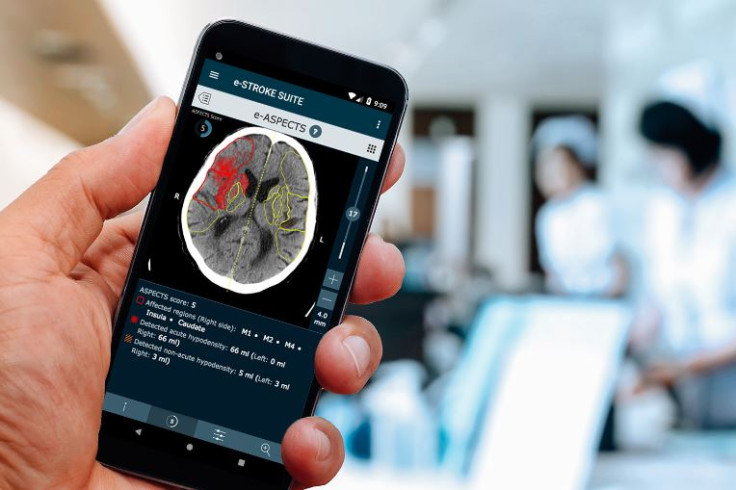NHS improves stroke treatment rates with AI platform for stroke imaging and monitoring
A new report provides valuable insights into how NHS Hospitals are using an AI platform for stroke imaging and monitoring for stroke care and treatment.

British people suffering from strokes are likely to get some relief and hope for faster treatment as a new report shows how Artificial Intelligence (AI) can help in the screening process, reducing the workload of the NHS.
This is in line with recent reports of the NHS using AI tools to reduce cancer radiotherapy wait times and skin cancer screening.
A report published earlier this month by Oxford Academic Health Science Network (Oxford AHSN) talks about a new AI platform e-Stroke that screens people's CT scans and MRI scans in order to check for signs of strokes and cardiac arrests, ultimately alerting the doctors who can then identify and treat such stroke patients.
This will make time-sensitive life-changing treatments easily and instantly available to people.
AI platform for stroke imaging and monitoring to prevent disabilities
The prevalence of stroke amongst the people of the UK is quite high as 100,000 people suffer from strokes or cardiac arrests every year, revealed the new report titled "e-Stroke data 2023". Around eight in 10 people have a blockage in the brain called "ischaemic stroke".
A third of these 100,000 suffer from large vessel occlusion or LVO, a condition that prevents blood from reaching the neck or the brain, ultimately causing death or paralysis called stroke-related dependence.
The new AI platform for stroke imaging and monitoring could help in identifying these medical issues, resulting in quick decision-making by doctors and swift treatment.
This is crucial for preventing long-term disability and reducing brain damage related to strokes up to a certain extent.
This comes at a time when the UK government has pledged £13 million in AI-related funding for the healthcare sector.
Faster stroke treatment rates with the help of AI
There are a number of treatments for strokes like thrombolysis or IVT, mechanical thrombectomy or MT, and manual clot removal. However, these need to be administered within 4.5 hours of the symptoms and the waiting times at the NHS hospitals prevent such immediate treatment. Hence an AI platform for stroke imaging and monitoring could be of great help in this.
At present one out of eight patients admitted with a stroke are eligible for such IVT treatments. With the help of the AI screening platform, this number has markedly improved. As per the report, the AI platform for stroke imaging and monitoring could increase the stroke treatment rates of patients by more than 55 per cent.
Developed by a UK-based company Brainomix, the e-Stroke artificial intelligence platform increased the national average of stroke treatments from 3.6 per cent to 5.7 per cent when it was used in 24 NHS hospitals across the country, says the report.
Oxford AHSN's Chief Executive and Consultant Stroke Physician at Oxford University Hospitals, Professor Gary Ford CBE spoke of AI imaging technology's utility in transforming the lives of stroke patients.
Ford revealed how the e-Stroke artificial intelligence platform has been adopted by NHS hospitals at a rapid rate which speaks for its efficiency.
e-Stroke artificial intelligence platform to enhance national stroke care targets
The Brainomix AI platform for stroke imaging and monitoring processes the CT scans and MRI scans, ultimately alerting doctors about patients who need MT. This MT facility isn't offered by all NHS hospitals and hence treatment depends on referrals to stroke units with MT services. With an AI screen platform in place, stroke imaging and monitoring will improve, resulting in timely and accurate treatment for stroke patients.
This will also fulfil the 2019 NHS Long Term Plan which seeks to enhance the national targets for stroke care including an increase in the MT treatment rate from one per cent to 10 per cent.
The AI screening platforms could help in the early identification of LVO which increases the patients' eligibility for MT treatment. However, in the absence of specialist radiological image interpretation in most NHS hospitals that's not possible. Brainomix AI platform for stroke imaging and monitoring can be an effective solution for this.
The e-Stroke AI screening platform also enables doctors across NHS hospitals in England to connect and process the data. It can be done in less than two minutes over smartphones, thus reducing patient wait times. This is in line with recent reports of the NHS using AI tools to reduce cancer radiotherapy wait times and skin cancer screening.
This AI imaging technology was developed in support of the UK government as they funded for the rollout and adoption of this AI diagnosis software in 2020.
Speaking about the matter Brainomix Chief Medical and Innovation Officer Dr George Harston, who is also a Consultant Stroke Physician highlighted the higher rates of MT treatment in the e-Stroke enabled hospitals.
Harston revealed that feedback from the NHS doctors and medical professionals has helped in making e-Stroke more efficient and effective. The company is looking forward to the results of the largest real-world independent evaluation of an AI platform for stroke imaging and monitoring, Harston added.
© Copyright IBTimes 2025. All rights reserved.






















